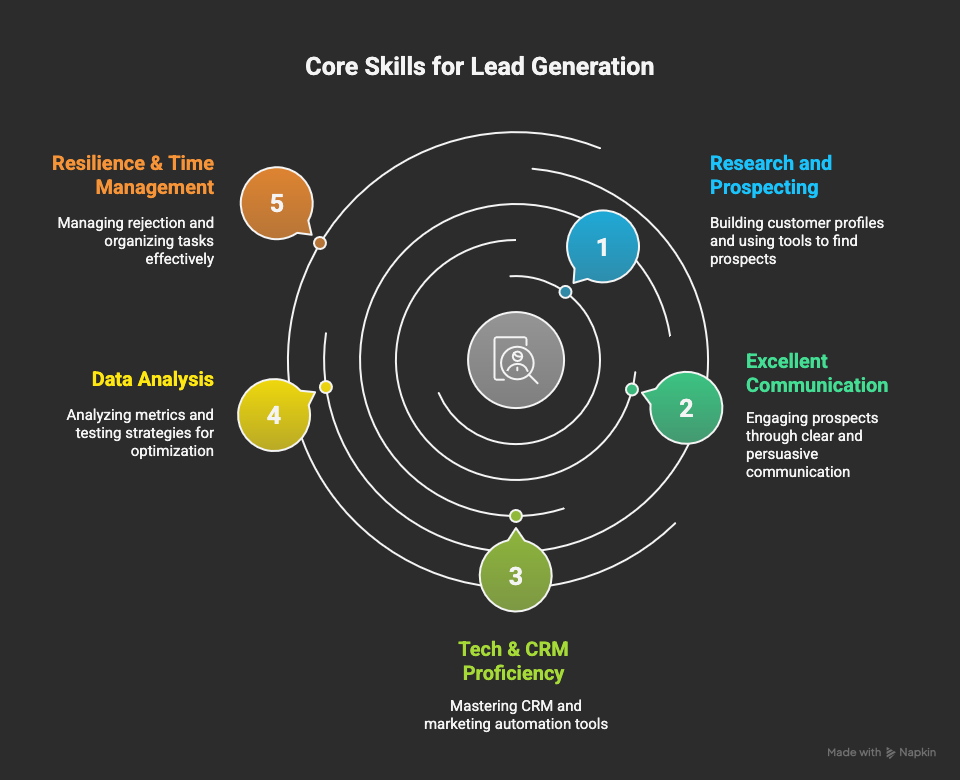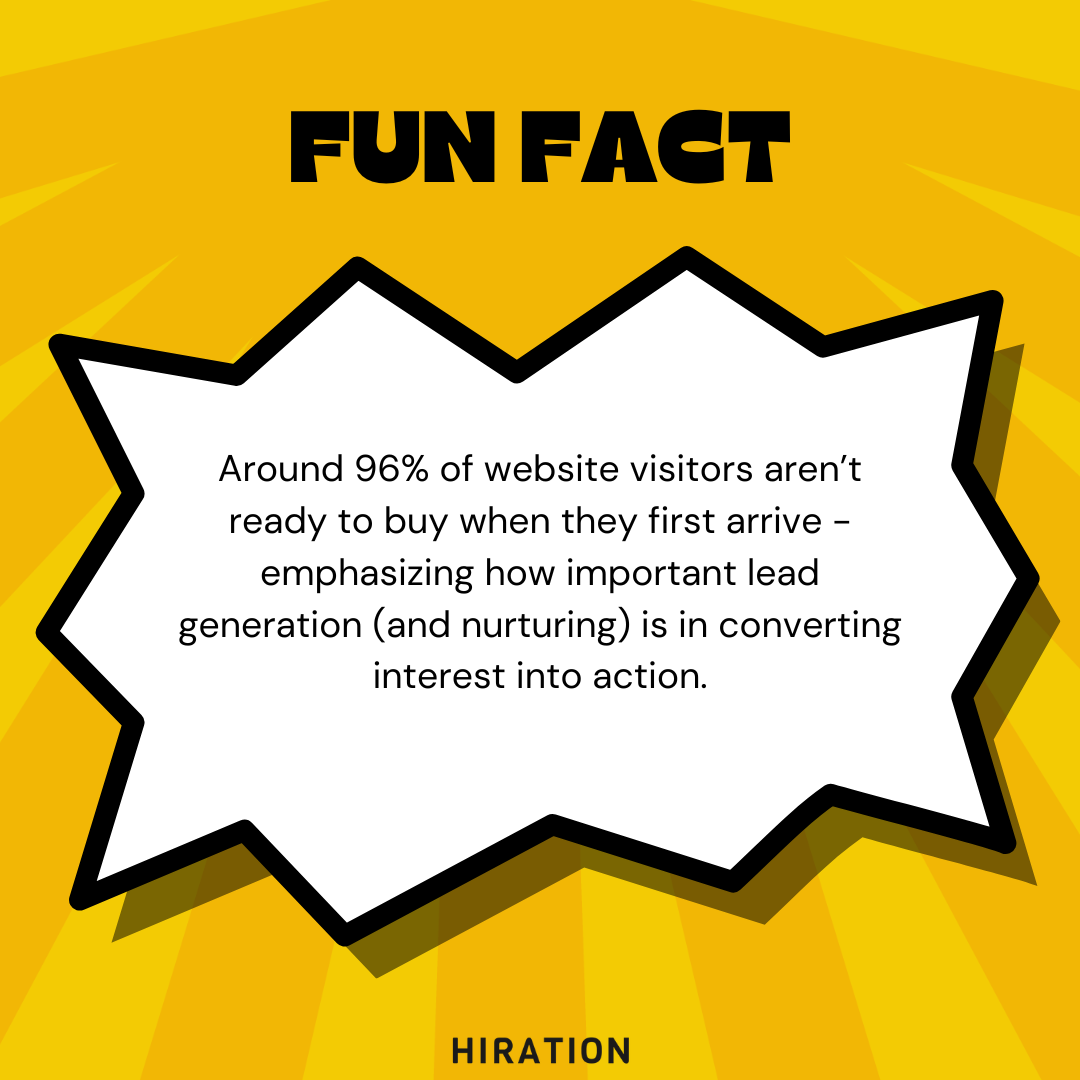How can you become a Lead Generation Specialist in 5 practical steps?
Becoming a Lead Generation Specialist starts with mastering research, communication, and CRM tools. You’ll learn to identify target customers, write persuasive outreach messages, analyze campaign data, and stay resilient through rejections. Build experience through SDR roles, certifications (like HubSpot or Salesforce), and metric-driven results. With proven impact, this path can grow into demand generation, marketing operations, or sales leadership roles.
In the world of business, nothing happens until a sale is made. But even before that, nothing happens until a potential customer is found.
Yet, around 46% of B2B marketers say their top challenge is improving lead quality and conversion rates - proving that finding the right prospects is often harder than closing the deal.
This is where the Lead Generation Specialist becomes one of the most vital, in-demand roles in any company.
They are the explorers and navigators of the business world, responsible for finding the "X" on the treasure map that leads to new revenue.
This guide breaks down what the role is, what it takes to succeed, and how you can start your journey.
What is a Lead Generation Specialist?
A Lead Generation Specialist is a professional who identifies, attracts, and qualifies potential customers (leads) for a business. They are the critical first step in the sales process, building a strong pipeline of prospects for the sales team to engage.
Their goal is to turn strangers into people who have expressed a genuine interest in the company's product or service.
While marketing builds brand awareness, the specialist focuses on capturing that interest and sorting it.
They determine if a lead is a Marketing Qualified Lead (MQL) (someone who engaged with marketing content), a Sales Qualified Lead (SQL) (someone who is ready for a sales conversation), or even a Product Qualified Lead (PQL) (someone who has already used a free version of a product).
The importance of this role can't be overstated. A staggering 91% of marketers say lead generation is their most important goal.
Yet, nearly half of B2B companies report that generating enough leads is their biggest challenge. This gap is where a skilled specialist becomes invaluable.
What Are the 5 Core Skills for This Role?
A successful lead generation specialist is part-scientist, part-artist, and part-detective. They blend creative outreach with data-driven analysis. While job requirements vary, these five skills are non-negotiable.
1. Research and Prospecting
This is the "detective" work. You can't generate good leads if you don't know who you're looking for. This skill involves:
- Building Ideal Customer Profiles (ICPs) and buyer personas.
- Using tools like LinkedIn Sales Navigator, ZoomInfo, and industry databases to find the right companies and people.
- Understanding a prospect's pain points before you ever make contact.
2. Excellent Communication (Both Written & Verbal)
This is the "artist" part. Once you find a prospect, you have to engage them. This isn't just about talking; it's about elite communication skills:
- Copywriting: Writing clear, concise, and persuasive emails, social media messages, and ad copy that don't sound robotic.
- Verbal Skills: Being articulate and confident on the phone, whether it's a "cold call" or a warm qualification call.
- Active Listening: Understanding a prospect's needs by listening more than you talk, which builds trust and helps you qualify them effectively.
3. Tech & CRM Proficiency
This is the "scientist" part. The modern specialist lives inside their tech stack. A deep understanding of these tools is essential:
- CRM (Customer Relationship Management): Mastery of platforms like Salesforce or HubSpot is a must. You must be able to manage and update the database, track all interactions, and ensure data is clean.
- Marketing Automation: Knowing how to use tools (like HubSpot, Marketo, or Pardot) to build email nurture sequences and score leads is crucial. Companies are all-in on this, with 77% of marketers using automation to create personalized content.
4. Data Analysis
A great specialist is data-driven, not "gut-driven". You must be able to look at a campaign, understand the numbers, and make decisions. This includes:
- Analyzing key metrics: open rates, click-through rates, conversion rates, and cost-per-lead.
- A/B testing email subject lines, copy, and calls-to-action (CTAs) to see what performs best.
- Reporting on what's working (and what's not) to the wider sales and marketing teams.
5. Resilience & Time Management
You will face rejection - a lot of it. Emails will go unanswered, and calls will go to voicemail.
Resilience is key. Equally important is time management skills.
You'll be juggling research, outreach, follow-ups, and data entry, so you must be highly organized to stay on top of your pipeline.

What is a Lead Generation Specialist's Job Description?
A lead generation specialist's job description involves a fast-paced, multi-faceted routine focused on identifying, engaging, and qualifying potential customers.
While daily priorities can shift, the core responsibilities are a blend of strategy, active outreach, and data management, which typically break down like this:
- Morning (Strategy & Prep): The day often begins by checking the CRM for any new leads that came in overnight (e.g., from web forms). This is followed by analyzing the performance of running email and ad campaigns and then researching and building new prospect lists for specific industries or regions.
- Midday (Active Outreach): This part of the day is dedicated to execution. It involves conducting "outreach blocks" to send personalized emails and make calls to new prospects, following up with leads who have shown interest, and handling real-time inquiries via live chat or social media (especially LinkedIn).
- Afternoon (Collaboration & Admin): The final part of the day focuses on collaboration and data hygiene. This includes meeting with the sales team to review the quality of passed leads, meticulously logging all activities in the CRM, and collaborating with the marketing team on new "lead magnet" ideas like e-books or webinars.
How Do You Get a Job as a Lead Generation Specialist?
While a bachelor's degree in marketing, business, or communications can provide a helpful foundation, you don't always need a specific academic background to break into this field.
What matters most is demonstrating that you have the right skills and a results-oriented mindset. You can build this proof through three main avenues: certification, practical experience, and a metric-driven application.
1. Prove Your Knowledge with Certifications: The fastest way to show employers you understand the fundamentals is by obtaining industry-recognized certifications. Platforms like HubSpot, LinkedIn Learning, Udemy, and Salesforce offer excellent options. HubSpot’s free Inbound Marketing and Lead Management courses are considered industry standards.
2. Gain Essential Entry-Level Experience: Since lead generation is a specialized form of sales and marketing, the best way to land the job is to already have experience in a "pre-lead gen" role. Look for opportunities such as:
- Sales Development Representative (SDR) or Business Development Representative (BDR): These titles are often interchangeable with a Lead Generation Specialist and serve as the most common entry point.
- Marketing Internships: Any internship where you were involved with email marketing, content creation, or managing a contacts database provides perfect, relevant experience.
- Freelance or Volunteer Projects: Offer to do pro-bono or freelance lead generation for a small business or startup. Even a small project will give you concrete, real-world metrics to highlight on your resume.
3. Build a Metric-Driven Resume: When applying, do not simply list your job duties; you must show your quantifiable results. This is the single most important tip for getting noticed. Hiring managers want to see how you contributed to revenue.
- Instead of: "Responsible for sending cold emails and contacting prospects."
- Write: "Managed 3 outbound email campaigns that generated 25 qualified leads for the sales team and resulted in $X in pipeline revenue."
Similarly, ensure your resume summary leads with your biggest achievement, such as: "Driven lead generation specialist with a record of increasing MQLs by 20% within six months."
This focus on metrics is the difference between an applicant and a top candidate.

What is the Career Path and Salary Like?
A lead generation role is not a dead end; it's a launchpad. The career path is both clear and lucrative, as you are directly tied to revenue.
According to data from Salesroad, the financial picture is strong:
- Average Base Salary: ~$50,758 per year
- Average Total Compensation (with bonus/commission): ~$66,848 per year
Experience pays. A typical salary progression looks like this:
- Entry-Level (0-2 years): $32,000 - $45,000
- Mid-Level (3-5 years): $45,000 - $60,000
- Senior-Level (6+ years): $60,000 - $73,000+
The career path is exciting. From a specialist, you can grow into:
- Senior Lead Generation Specialist
- Lead Generation Manager (managing a team of specialists)
- Demand Generation Manager (a more strategic role overseeing the entire lead-to-revenue funnel)
- Marketing Operations Manager
- Sales Manager (especially if you have strong closing skills)
Ultimately, this role is the engine of the engine. It's a high-visibility, high-impact career for those who are curious, persistent, and love the thrill of the hunt.
Also Read: What are the highest paying sales job and how to bag them?
To Sum Up
Breaking into lead generation isn’t just about learning tools or scripts - it’s about showing that you understand how to connect value with opportunity.
The good news? You don’t have to figure it all out alone.
With Hiration, you can build a resume that highlights your measurable results, prepare for interviews with AI-driven feedback, and optimize your LinkedIn profile to attract recruiters in the sales and marketing space.
Thousands of professionals have already used Hiration to turn potential into performance - now it’s your turn.
Lead Generation Specialist — FAQ
What does a Lead Generation Specialist actually do?
They identify and qualify potential customers for a business, ensuring the sales team has a steady pipeline of high-quality prospects. Their role bridges marketing awareness and sales conversion.
What are the top skills needed for this role?
Research and prospecting, communication, CRM/automation proficiency, data analysis, and resilience. Each helps convert leads efficiently while managing high-volume outreach.
Which tools should I learn first?
Start with CRM systems like HubSpot or Salesforce. Then, learn lead-sourcing platforms (LinkedIn Sales Navigator, ZoomInfo) and email automation tools (Marketo, Apollo, or Outreach).
How can I gain experience if I’m new?
Take HubSpot’s free Inbound Marketing certification, do freelance lead-gen for startups, or start as an SDR/BDR. Even short-term projects give you measurable results to showcase.
What metrics should I include on my resume?
Show tangible impact—like “Generated 30 qualified leads in 3 months” or “Improved email open rates by 25%.” Hiring managers value numbers that prove you drive revenue.
Is a degree required to become a Lead Generation Specialist?
No. While marketing or business degrees help, skills and performance matter more. Many successful specialists come from communications, tech, or even customer service backgrounds.
What’s a typical day in this role like?
Mornings focus on research and CRM updates, midday is for active outreach via email or calls, and afternoons involve reporting, collaboration, and strategy with marketing and sales teams.
How much can I earn as a Lead Generation Specialist?
Average base pay is around $50K, with total compensation (bonuses and commissions) averaging $66K+. Experienced professionals can move into six-figure roles in demand generation or sales leadership.
What are the next career steps after this role?
Career growth paths include Lead Generation Manager, Demand Generation Manager, Marketing Operations Manager, or Sales Manager—each offering broader strategy and leadership opportunities.
How can Hiration help me land a lead generation job?
Hiration helps you build a metric-driven resume, optimize your LinkedIn profile, and prepare for interviews using AI-powered feedback—highlighting achievements that convert your skills into offers.



